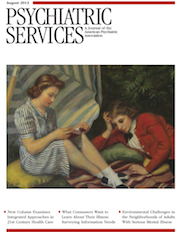Trauma, Psychopathology, and Violence: Causes, Consequences, or Correlates?
Cathy Widom, distinguished professor at John Jay College and a president of the American Psychopathological Association (APPA), has been exploring the depths of human violence for a good part of her life, collecting data, analyzing that data, and sharing her findings with the world. Trauma, Psychopathology, and Violence, which Widom edited, is a fine collection of review chapters.
This is not a book for those looking for an introduction to the subject matter. Dr. Widom has brought together a number of academics and researchers from the United States as well as the United Kingdom, all of whom have expertise in the results of exposure to various forms of traumatic experience, including disasters, combat, child abuse, and terrorism. The contributors’ expertise is reflected in the exploration of these complex issues from many points of view, beginning with discussion of the heterogeneous nature of what are here referred to as posttraumatic syndromes and then exploring the biological and genetic factors in understanding the connections between trauma, violence, and psychopathology. One chapter is devoted to a review of epigenetic pathways and another to teasing out the role of genotype in helping to understand the development of problems for maltreated children. Several chapters describe the various ways in which childhood trauma, particularly exposure to family violence, as well as to disaster, war, and terrorism, increase an individual’s risk for a wide variety of psychopathological outcomes, including antisocial personality disorder. Another chapter looks at psychopathology and trauma exposure among recent combat veterans. Expanding beyond the immediate interpersonal context, several chapters look at the community and cultural context, with a particular emphasis on the sense of community after disaster as well as general health risks to children after exposure to family violence.
Two chapters wrestle with the difficult question of causality as it relates to trauma, violence, and the development of psychopathology, with one chapter focusing on causality after disasters and the other on a complex systems approach emerging in public health studies to adequately research what is, as the title suggests, cause, result, or correlation. The book ends with what was originally Dr. Widom’s presidential address to the APPA; in this summary chapter, Widom and a coauthor focus on Widom’s lifelong concern—that of disentangling the connections between childhood trauma exposure and the development of later pathological behavior.
This is a book aimed at experts in fields related to the subject matter. Each chapter provides an excellent review of the subject matter with extensive references. The assumption on the part of most of the authors appears to be that the reader will already have a well-grounded knowledge in his or her particular area and be well versed in research methods. The more general reader and many practicing clinicians looking for guidance in actually working with patients may find the volume less than fully satisfying, but for researchers and academicians this is a helpful—even necessary—addition to their bookshelves.



